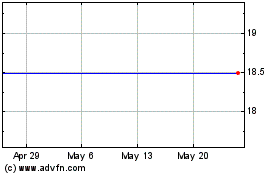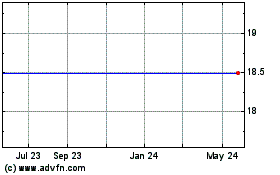By Suzanne Kapner and Joshua Jamerson
Coach Inc. agreed to acquire rival Kate Spade & Co. for $2.4
billion, as the handbag and accessories maker seeks to tap younger
consumers amid slower growth in the handbag market.
Sales of handbags are lagging as women have traded down to
smaller, less expensive purses and aggressive discounting both in
stores and online has pressured profits. The proposed merger would
combine two big U.S. players, creating a company with $5.9 billion
in annual sales and 1,300 retail stores and outlets around the
world.
On Monday, Coach Chief Executive Victor Luis said there is
little overlap between customers of the two brands, especially
since Coach has tried to move upscale in recent years. The
attraction of Kate Spade was its appeal to younger shoppers, Mr.
Luis said, adding that only 10% of consumers say they buy both
brands.
"Kate Spade has the highest penetration among millennials within
our competitive set," Mr. Luis said in an interview. "Millennials
offer a market that is substantial in terms of size and allows us
to recruit younger customers." According to Jefferies analyst
Randal Konik, millennials account for about two-thirds of Kate
Spade's shoppers.
"I've been buying Kate Spade since I got my first job," said
Bianca Damionne, a 22-year-old who works in New York City.
"I hope Coach doesn't change things, because I like Kate Spade
now," she said on Monday while shopping in a Kate Spade shop on
Fifth Avenue. "The style, the colors, everything."
The handbag market has slowed to about 2% annual growth from as
much as 15% growth six years ago, said Craig Johnson, an analyst at
Customer Growth Partners. Coach has responded by targeting a
slightly older and wealthier client with higher-priced bags,
creating a gap for younger 20-something shoppers that it can fill
with Kate Spade, Mr. Johnson said.
The industry could see more consolidation, as rivals scramble to
line up their own deals. "If you want growth in North America, you
will have to make an acquisition, because the market is saturated,"
said Neil Saunders, managing director of the research firm
GlobalData Retail.
Mr. Luis said he still has confidence handbags and leather goods
are better positioned than other corners of retail. "Consumers
continue to shift dollars away from apparel to handbags,
accessories and footwear," he said.
Coach will pay Kate Spade shareholders $18.50 a share in cash.
That represents a 28% premium to Kate's closing price as of Dec.
27, the last trading day before a Wall Street Journal report that
Kate was exploring a sale of the company after coming under
pressure from an activist shareholder. The company confirmed it was
reviewing such options in February.
Kate Spade shares rose 8.3% to $18.38 on Monday, while Coach
shares climbed 4.8% to $44.71.
The companies, both based in New York, have battled a retail
environment that has been challenging, especially for designers
with significant exposure to department stores, where traffic has
declined. U.S.-based luxury brands are also hurt by a strong U.S.
dollar.
Coach had revenue of $4.5 billion in the fiscal year ended July
2016, down from more than $5 billion a few years ago. Kate Spade,
which shed several apparel brands to focus on its handbag business,
had revenue of $1.4 billion in the year ended Dec. 31.
Sales at Coach started to grow again in recent quarters as it
pulled back from department stores, closed a third of its
full-priced stores in North America and cut back on promotions. The
company said it plans to reduce online flash sales as well as
distribution in off-price chains like T.J. Maxx for Kate Spade
after the deal closes, which is expected to occur in the third
quarter.
Mr. Luis said 35% of Coach stores overlap with Kate Spade stores
in North America but he doesn't foresee widespread closures
following the combination. However, analysts said there are still
too many stores given sluggish traffic at malls.
"Anybody who's been to Woodbury Common outlets and seen two
Coach (women and men) and two Kate Spade stores (accessories and
apparel) all within 30 yards of each other doesn't need a rocket
science degree to know that the combined company doesn't need all
that space," Mr. Johnson said, referring to a shopping center
outside of New York City.
Coach does plan to expand Kate Spade outside the U.S.,
particularly in China and Europe, where the brand has a few dozen
stores and outlets. And Mr. Luis said there is an opportunity to
buy out some joint venture partners or distributors in those
regions.
Coach has been on the hunt for acquisitions as Mr. Luis seeks to
build a collection of brands and respond to the rapid rise of
Michael Kors Holdings Ltd. Coach approached Burberry Group PLC
about a takeover last year but was rebuffed, according to people
familiar with the situation, and it was seen by analysts as a
potential suitor for Jimmy Choo, which put itself up for sale last
month. Coach recently hired former Jimmy Choo CEO Joshua Schulman
as president of its namesake brand.
But Choo, which is valued at over $1 billion by some estimates,
would likely be too big for Coach to swallow in the wake of its
Kate Spade deal. Mr. Luis said the company could make additional
acquisitions in the near term, but they would likely be of a size
similar to Stuart Weitzman Holdings LLC, a shoe maker it bought in
2015 for about $574 million.
Analysts say Kors is more concerned with turning around its own
brand than buying a competitor at this point. It suffered from many
of the same problems that plagued Coach, including overexpansion
and heavy discounting. "With Kors trading in such deep value
territory," wrote Mr. Konik of Jefferies in a recent report, "we
believe share repurchases would be a better alternative for
rewarding investors."
The brands will be kept separate and there are no plans to
cross-sell products at each other's stores, executives said. Mr.
Luis said his intention was to retain key Kate Spade employees
including Craig Leavitt, who will continue to serve as chief
executive of the Kate Spade brand.
The transaction is subject to the tender of a majority of the
outstanding Kate Spade shares as well as regulatory approvals.
Kate Spade can terminate the transaction if the company is
offered a superior proposal from another suitor, and Coach can
terminate the deal if Kate Spade's board no longer supports it.
Either circumstance would require Kate Spade to pay Coach an $83.3
million termination fee. Either company can call off the deal if it
isn't complete by Feb. 7.
Write to Suzanne Kapner at Suzanne.Kapner@wsj.com and Joshua
Jamerson at joshua.jamerson@wsj.com
(END) Dow Jones Newswires
May 08, 2017 18:21 ET (22:21 GMT)
Copyright (c) 2017 Dow Jones & Company, Inc.
Kate Spade & Company (NYSE:KATE)
Historical Stock Chart
From Dec 2024 to Jan 2025

Kate Spade & Company (NYSE:KATE)
Historical Stock Chart
From Jan 2024 to Jan 2025
